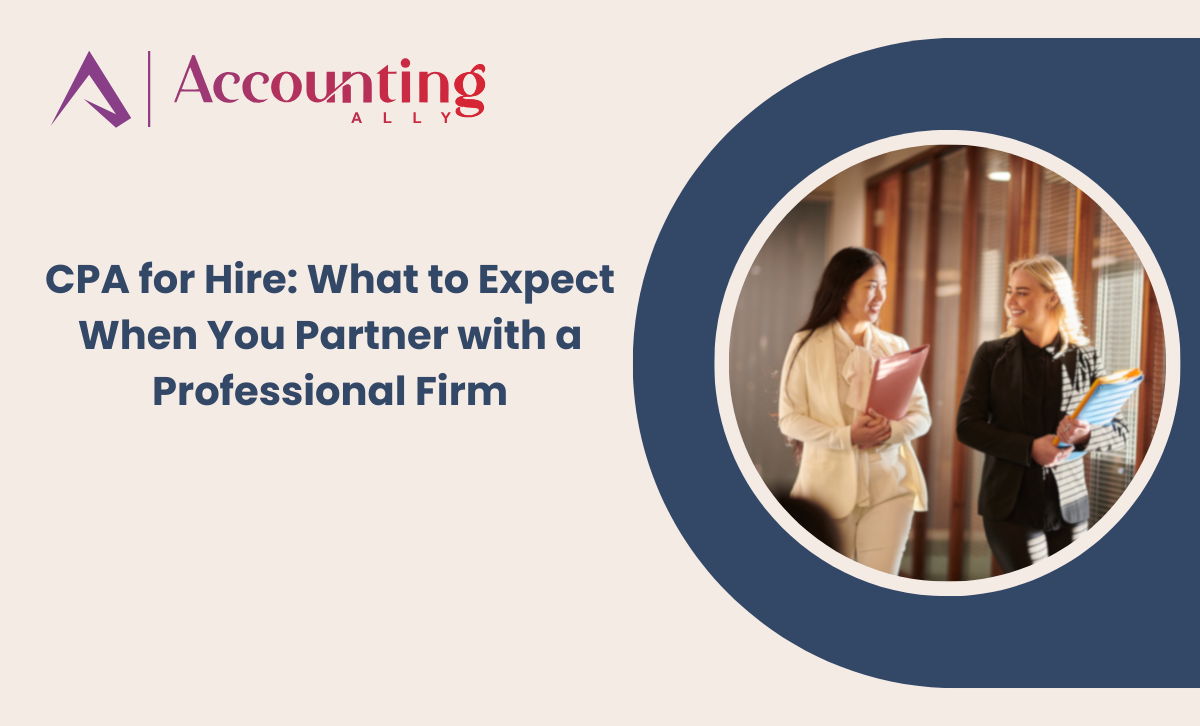CPA for Hire: What to Expect When You Partner with a Professional Firm
Small and medium-sized businesses face complex financial challenges in today’s fast-paced market. Many are turning to a CPA for hire to gain expert financial guidance, ensure compliance, and support long-term growth.
Here’s what you need to know about partnering with a CPA:
- Professional Expertise: CPAs bring specialized knowledge in tax planning, financial reporting, and strategic financial management
- Time-Saving Solution: Outsourcing financial tasks allows business owners to focus on core operations and growth
- Risk Management: Professional oversight helps prevent costly financial mistakes and ensures regulatory compliance
- Scalable Support: CPA services can adapt to your business’s changing needs and growth trajectory
The decision to hire a CPA represents a strategic investment in your business’s financial health. Understanding the engagement process, expected deliverables, and communication protocols helps create a productive partnership with your chosen CPA firm.
This guide explores essential aspects of working with a CPA, helping you make informed decisions about outsourcing your financial management needs.
Understanding the CPA Engagement Model
The journey of partnering with a CPA firm follows a structured engagement model designed to create a seamless financial management experience. Here’s what SMBs can expect:
Initial Consultation Process:
- Free discovery call to discuss business goals and pain points
- Review of current financial systems and processes
- Assessment of compliance requirements
- Identification of immediate financial challenges
- Discussion of potential solutions and service options
Service Level Options:
Basic Package: Monthly bookkeeping, bank reconciliation, basic financial statements, annual tax preparation
Standard Package: Quarterly financial reviews, cash flow management, budgeting assistance, tax planning strategies
Premium Package: Monthly strategic consulting, custom financial reporting, business growth advisory, CFO-level support
Engagement Timeline:
- Week 1: Documentation collection and system setup
- Week 2: Implementation of accounting procedures
- Week 3: Staff training and process integration
- Week 4: Full service activation and monitoring
The engagement model adapts to your business needs, allowing for service adjustments as your company grows. Most CPA firms offer flexible arrangements, from project-based work to ongoing retainer relationships, ensuring you receive the right level of support for your business stage.
Types of Services Offered by CPAs
CPAs offer a wide range of financial services designed to cater to the various needs of small and medium-sized businesses (SMBs):
Core Financial Services
- Monthly bookkeeping and account reconciliation
- Financial statement preparation
- Payroll processing and tax filing
- Bank account management
- Tracking accounts payable and receivable
Tax Services
- Preparing annual tax returns – Tax Return Software for CPA Firms
- Planning taxes on a quarterly basis
- Ensuring compliance with sales tax regulations
- Filing taxes in multiple states
- Representing clients during IRS audits
- Identifying potential tax credits
Strategic Financial Services
- Forecasting cash flow
- Developing and monitoring budgets
- Analyzing profit margins
- Valuing businesses
- Supporting mergers and acquisitions
- Assessing financial risks
Specialized Advisory Services
- Providing compliance reporting specific to certain industries
- Implementing financial software solutions
- Designing internal control systems
- Conducting audits of employee benefit plans
- Planning for succession in businesses
- Developing strategies for growth
Compliance and Reporting
- Monitoring regulatory compliance
- Preparing annual reports
- Supporting financial audits
- Assisting with government filings
- Documenting corporate governance practices
These services can be tailored to suit the size of your business, specific industry requirements, and stage of growth. Many CPAs also offer service packages that combine multiple offerings to provide comprehensive financial management solutions.
Cost Considerations When Hiring a CPA
Understanding CPA pricing helps businesses budget effectively for professional financial services. Here’s what you need to know about CPA costs:
Hourly Rate Structure
- Entry-level CPA services: $150-$250 per hour
- Senior CPA expertise: $300-$500 per hour
- Specialized consulting: $500-$800+ per hour
Monthly Retainer Options
- Basic bookkeeping and tax services: $500-$1,000
- Comprehensive financial management: $1,500-$2,500
- Full-service strategic partnership: $2,500-$5,000+
Factors Affecting CPA Pricing
- Business size and complexity
- Transaction volume
- Industry-specific requirements
- Geographic location
- Service scope and frequency
- Required expertise level
Value-Based Pricing Models
- Fixed-fee arrangements for specific projects
- Performance-based fees tied to cost savings
- Bundled service packages
- Tiered pricing structures
Cost-Saving Strategies
- Bundle services for package discounts
- Schedule regular maintenance to prevent costly issues
- Prepare documentation ahead of meetings
- Use cloud accounting software for efficient collaboration
- Choose service levels matching business needs
The investment in CPA services varies based on business requirements and chosen engagement models. Smart planning and clear communication about service needs help establish realistic budgets for professional financial support.
Deliverables from a CPA Firm: What to Expect
A professional CPA firm provides a comprehensive suite of deliverables tailored to your business needs:
1. Financial Statements
- Balance sheets reflecting your company’s financial position
- Income statements tracking revenue and expenses
- Cash flow statements monitoring liquidity
- Customized financial reports for stakeholders
2. Audit Services
- Internal control assessments
- Risk evaluation reports
- Detailed audit findings
- Recommendations for process improvements
3. Compliance Documentation
- Tax returns for various jurisdictions
- Regulatory compliance certificates
- Industry-specific reporting requirements
- Documentation for financial institutions
4. Strategic Financial Planning
- Business valuation reports
- Merger and acquisition analysis
- Succession planning documents
- Growth strategy recommendations
5. Management Reports
- Key performance indicator (KPI) dashboards
- Budget variance analysis
- Profitability reports by product/service
- Market comparison metrics
Each deliverable comes with detailed explanations and actionable insights to help drive informed business decisions. Your CPA firm should provide these documents in both digital and physical formats, ensuring secure access through encrypted platforms.
Effective Communication Protocols with Your CPA
Communication is the backbone of a successful CPA engagement. A lack of clear communication can lead to misunderstandings, missed deadlines, and compliance issues. When working with a CPA firm, it’s important to establish clear communication protocols right from the beginning. Here are some key elements CPA firms to scale to consider:
- Initial Planning Sessions: Use kickoff meetings to define objectives, share documentation, and set expectations for how and when communication will occur.
- Regular Check-Ins: Schedule consistent calls or virtual meetings—monthly, biweekly, or quarterly depending on the nature of your engagement.
- Preferred Communication Channels: Decide whether emails, phone calls, video meetings, or client portals will be the primary mode of communication.
- Responsiveness Standards: Set expectations on how quickly queries will be answered—especially during high-stakes periods like tax season or audits.
- Centralized Documentation: Use cloud-based tools to store and share files securely, reducing the risk of lost or outdated information.
- Status Updates and Reports: Request periodic summaries of work completed, pending tasks, and insights discovered along the way.
The goal is to foster transparency, clarity, and trust. A good CPA firm will not only be responsive but also proactive in communicating potential issues, upcoming deadlines, and strategic recommendations.
Benefits of Partnering with a Professional CPA Firm for SMBs
Small and mid-sized businesses often face resource limitations, making it essential to have expert financial guidance. A professional CPA firm provides not just routine accounting, but strategic direction that can have a transformative impact on your operations. By partnering with experienced professionals, businesses gain access to accurate financial reporting, timely compliance with regulations, and data-driven decision-making tools.
This partnership also enhances operational efficiency, as CPAs handle the heavy lifting of bookkeeping, tax preparation, and financial analysis—allowing business owners to focus on growth initiatives. More importantly, a CPA firm brings an outsider’s perspective and offers objective advice that may reveal hidden opportunities or risks.
For SMBs seeking to build credibility with investors, lenders, or partners, having professionally managed financial statements and strategic documentation becomes invaluable. This kind of support can be the difference between stagnation and scale. A CPA firm becomes more than a service provider—it becomes a trusted advisor embedded in the long-term vision of your business.
Choosing the Right CPA Firm: Key Considerations
Not all CPA firms are created equal. Selecting a suitable CPA firm requires careful evaluation of multiple factors to ensure a productive long-term partnership. Here are essential qualifications and considerations to guide your decision:
Essential Qualifications:
- Valid CPA license and professional certifications
- Clean record with state accounting boards
- Professional liability insurance coverage
- Strong technological infrastructure for secure data handling
- Proven track record with similar-sized businesses
Industry-Specific Expertise:
- Experience in your business sector
- Knowledge of industry-specific regulations
- Understanding of common tax challenges in your field
- Familiarity with relevant software and tools
- Track record of successful client outcomes
Red Flags to Watch For:
- Reluctance to provide references
- Unclear pricing structure
- Poor response times during initial contact
- Limited knowledge of your industry
- Outdated technology systems
When Considering Offshore CPA Firms:
- Verify international certifications
- Check time zone compatibility
- Assess language and cultural alignment
- Review data security protocols
- Understand their communication infrastructure
Questions to Ask Potential CPAs:
- How do you stay current with tax law changes?
- What’s your approach to proactive tax planning?
- How do you handle client emergencies?
- What’s your staff turnover rate?
- How do you measure client satisfaction?
Conclusion: Empowering Your Business Financial Management with a Professional CPA Partner
In an increasingly complex business environment, having a CPA for hire is more than a luxury—it’s a necessity. A professional CPA firm offers far more than compliance; it provides clarity, strategy, and peace of mind. From routine bookkeeping to in-depth financial analysis, the value brought by a skilled CPA team can be transformative.
When you partner with the right CPA firm, you’re not just outsourcing tasks—you’re building a relationship that supports the long-term success and sustainability of your business. So whether you’re navigating a new tax code, expanding into new markets, or simply trying to keep your books in order, remember that the right CPA for hire can make all the difference.
Your business deserves expert financial guidance. Whether you’re choosing between a certified management accountant or a CPA, the right professional partnership will drive your business toward sustainable growth and financial success. Start your search today and secure your business’s financial future with a trusted CPA partner.
FAQs
What is a CPA for hire and how can it benefit small and medium-sized businesses (SMBs)?
A CPA for hire is a professional accounting service that SMBs can outsource to manage their financial needs. By partnering with a CPA firm, businesses can access specialized knowledge, optimize tax strategies, and enhance their financial management without the overhead of full-time staff.
What types of services do CPAs offer to SMBs?
CPAs provide a range of services tailored to SMBs, including bookkeeping, tax preparation, compliance reporting, budgeting, cash flow management, and strategic financial consulting. These services help businesses maintain compliance and make informed financial decisions.
How do I engage a CPA firm for my business?
Engaging a CPA firm typically starts with an initial consultation to assess your financial needs. From there, you can discuss various service levels offered by the CPA, which may range from basic bookkeeping to advanced financial consulting.
What are the cost considerations when hiring a CPA?
The cost of hiring a CPA can vary based on several factors including the complexity of your financial needs and the pricing model used by the firm. Common pricing models include hourly rates or monthly retainers. It’s important to discuss these costs during your initial consultation.
What deliverables can I expect from a CPA firm?
When partnering with a CPA firm, you can expect deliverables such as detailed financial statements, audits, compliance reports, and strategic recommendations tailored to your business’s financial goals.
How can I ensure effective communication with my CPA?
Establishing clear communication protocols is crucial for effective collaboration with your CPA. Utilizing technology such as cloud accounting solutions allows for real-time communication and easy document sharing, enhancing the overall partnership experience.


